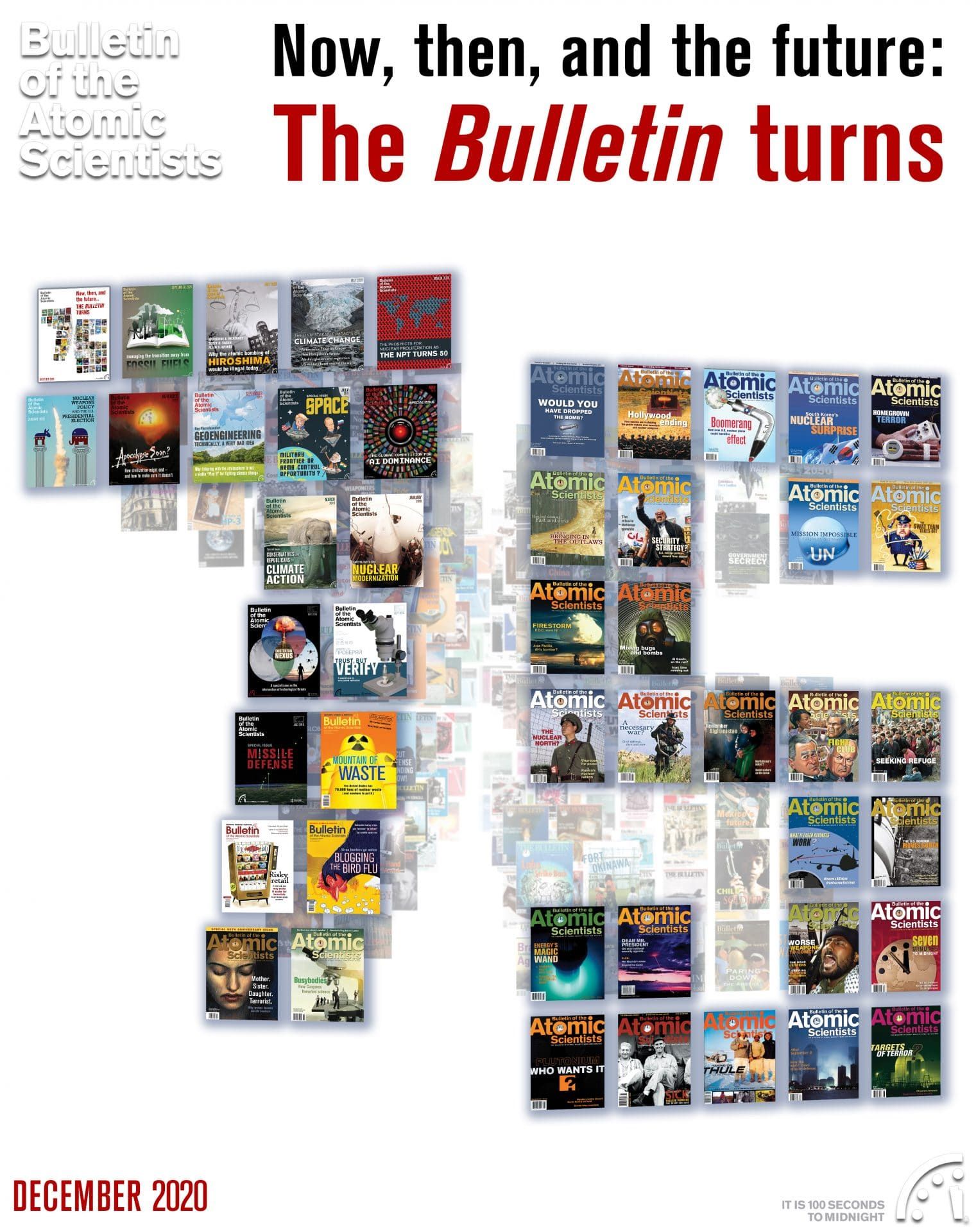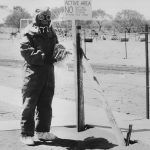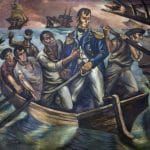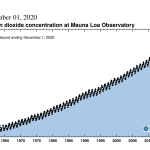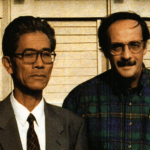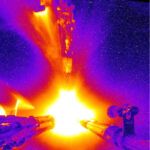1956: Science and our times
By J. Robert Oppenheimer | December 7, 2020
1956: Science and our times
By J. Robert Oppenheimer | December 7, 2020
Editor’s note: This article was originally published in the September 1956 issue of the Bulletin. It is republished here as part of our special issue commemorating the 75th year of the Bulletin.
Our times have been deeply marked by science. What we think of it will shape the future. It is a great testament to man’s power and his reason; it is equally a testament to their limits.
No one can have had the experience of new discovery, can have witnessed the transmutation of mystery to understanding and order and then to greater mystery, without learning both of our helplessness and our great strength. Science sustains a view of man, piteously and even comically impotent, yet with a dignity and hope quite special to him. This is the view of man of the days of the Enlightenment, and of the founding of this Republic. It seems quite in harmony with the teachings and spirit of the Stoics, with the blend of stoic tradition and Christian sensibility that characterized the emergence of the modem world. A sunny, hopeful view of science prevailed even in the early years of this century, during our childhood, though a few anxious observers had found the seeds of misgiving. Think, for instance, of Henry Adams, and his related concern for the rise of the specialist, and of the machine.
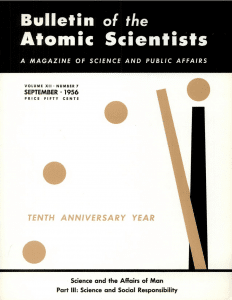 Among the founders of the United States it is natural for us to remember Franklin and Jefferson: they were both in some real sense men of science as well as statesmen. They looked to science as an essential part of this country’s heritage. They saw first that in practical terms it was a strong tool against misery and poverty and squalor. They rightly understood that science would contribute to the well-being and the civility of life in America. They saw it in intellectual terms as a guard against ignorance and superstition. They saw it in political terms as a guard against tyranny, barbarism, repression, and bigotry that they associated with centuries past, with the religious wars, the inquisition, and what they thought of as the dark ages. For them it was incompatible only with an authoritarianism, by which, they were determined, this country should never be darkened.
Among the founders of the United States it is natural for us to remember Franklin and Jefferson: they were both in some real sense men of science as well as statesmen. They looked to science as an essential part of this country’s heritage. They saw first that in practical terms it was a strong tool against misery and poverty and squalor. They rightly understood that science would contribute to the well-being and the civility of life in America. They saw it in intellectual terms as a guard against ignorance and superstition. They saw it in political terms as a guard against tyranny, barbarism, repression, and bigotry that they associated with centuries past, with the religious wars, the inquisition, and what they thought of as the dark ages. For them it was incompatible only with an authoritarianism, by which, they were determined, this country should never be darkened.
The nearly two centuries that have elapsed since then have more than fulfilled the promise they saw. In the last years, we have moved, through discoveries in chemistry, biochemistry, and genetics, by great steps nearer to an understanding of the origin of life, and its characteristic stability, variety, mutability, and form. We understand how, under the conditions prevailing on earth very long ago, organic materials characteristic of life would almost necessarily be formed from inorganic matter. In the coding, information bearing, and information transmitting characteristics of some nucleic acids, we have a beginning of an understanding of how living matter instructs its progeny to be a mold, an elephant, a tulip, or a man. We understand stars and galaxies today better than we understood the minerals of this earth a century ago. We even understand much of the evolution and history of stars, as they brighten and darken, fade, explode, and form again from dust. We are in the midst of finding an answer to the ancient questions of the constitution of matter. In this field we are today so beset by novelty, paradox, and puzzlement that we cannot escape the sense of a vast, strange new order waiting to be discovered. For the first time, we are beginning to learn some of the subtleties of perception and of memory. We know that the very maintenance of the rational faculties—the ability, for instance, to add and to subtract—and of memory itself, requires the constant flow of unnoticed sensory stimuli.
The practical consequences of the application of science are everywhere about us; they have contributed to the largely new world in which we live. Some of these consequences are profoundly troublesome; of part of that I shall speak. Many appear today as mixed blessings: the automobile, the television tube, the antibiotics, call perhaps for somewhat greater wisdom than we have shown. But characteristically and overwhelmingly the applications of science have alleviated man’s sufferings, moderated his harshest limitations, and responded to his long-sustained aspirations. We live longer, labor less brutally, more seldom suffer starvation, find frequent comfort and relief in illness, travel, communicate, and learn with undreamed-of ease; and we need no slave or peon.
It is a mark of our time that these changes must spread throughout the world; the world cannot endure half-darkness and half-light. This is of course not all that we see stirring the peoples of Asia and Africa today; but surely it is a great and central part, and a most enduring part, of the need and the reality of change. What we have learned will not easily be lost; knowledge once given will not easily be lost in world-wide darkness as long as man endures; the powers that it gives offer too much to mankind for the sciences to desist or regress. It is true that there once were what we call the dark ages. They touched only one of the world’s civilizations; the knowledge they ignored for the most part survived elsewhere; and the sciences that languished had, in Greek and Hellenistic times, only the frailest of beginnings, had not begun to attain the instruments, the power, the success, the application, nor the explosively cumulative character that mark them today. In this one limited sense, man’s course cannot now be retrograde; in this one sense progress is inevitable.
* * *
It is my purpose here to identify two among many of the ways in which the great growth of science has created new problems for us. Both problems seem grave to me. They do not appear to me to be very directly related, except that it is we, in our time, who must learn to live with them. One has to do with the powers that knowledge makes possible, and one with the effect of this explosive growth of knowledge on the nature of our culture. What is troublesome in the new situation may not be easy to alter. We must start by trying to understand it.
It is not new that knowledge brings power, and that among the powers may be the power to do evil. In modem science there is much such knowledge. It cannot be lost; it leads to powers the exercise of which spell disaster. The most familiar, though not the deepest example is the discovery of nuclear weapons, and the associated machinery of war. These have brought to a large part of mankind an appalling prospect of devastation and death, an apocalyptic vision of what would be a terrible reality. Much has been said of the prospect that man, along with many other forms of life, might lose his genetic inheritance, would disappear as a species. In time, not a long time, that may come to be possible. What is more certain and more immediate is that we would lose much of our human inheritance, much that has made our civilization and our humanity, very much of our life.
In the great strides in the biological sciences, and far more still in the early beginnings of an understanding of man’s psyche, of his beliefs, his learning, his memory, and his probable action, one can see the origin of still graver problems of good and evil. Today we know very little of these matters. We have little patches of illumination and understanding, unrelated to any assured corpus of reasonably certain knowledge. If today we have technical means for better predicting man’s behavior, the improvement is at best marginal. How shall we meet with wisdom the greater and more certain knowledge of how to make people think and do? Foreshadowing of this time we see both in brainwashing, and in propaganda, that unhallowed marriage of crude psychological lore with the advanced technology of communication.
The problem of these great powers is not made easier by the autonomy of the three-score governments that make up the world, nor by the little understood and intricate dispersal of power that characterizes some of the best of them, nor by the absence of any common code of conduct or common view of man between them. The problem is not made easier by the Communist powers, by their denial of any essential community with other societies, their long tradition of hostility, and their extreme, morbid preoccupation with power. It is not made easier by the experience of vast continents, whose history of European rule has induced a passion for national enhancement, and a low and bitter appraisal of the Western heritage. In any real or immediate sense, it does not appear to be a soluble problem. The threat of the apocalypse will be with us for a long time; the apocalypse may come.
We can see perhaps only the dimmest outline of a course that, in the long term, may be hopeful: the creation of honest and viable international communities, with increasing common knowledge and understanding. Of all such communities, those dealing with the sciences and their applications, those in which hope and danger are most intimately mixed, seem, if the most difficult to create, the most hopeful for our future. Such were indeed the hopes entertained at the War’s end by many who had worked on the atomic project. They were in large part embodied in the Acheson-Lilienthal report, early in 1946, on how—in the words of that time—”cooperation might replace rivalry” in the development of atomic energy. Perhaps the world was not ripe nor ready. Perhaps we were not fully ready. Certainly the Soviet government was not ready.
Shall we find other opportunities? We may. Looking at the broad ranges of science, with all its portents of benefit and misery, I should think that the answer was “yes.”
The second element of novelty that science has brought to us, like the first, is a change in scale; it is not something wholly new; and like the first, it is an inherent, necessary accompaniment of the great success of the sciences. It is not new that what has been learned in the recent past is more than was learned in all of man’s earlier history. Men said that in the eighteenth century, and they were right. It continues to be true.
Positive knowledge, what is recorded in the technical books and learned journals, all of it that is new and true and not trivial, is of course not wisdom; it can on occasion almost appear incompatible with wisdom. I think that such positive knowledge doubles in less than a generation, perhaps in a decade. This means that most of what there is to know about the world of nature was not discovered when a man went to school; it means that universal knowledge, always, even in Leonardo’s day, a dream, but not an irrelevant dream, has become a mockery; it means that the specialized sciences, genetics, for instance, or astrophysics, or mathematics, are like the fingers of a hand: they all arise from the common matrix of common sense, from man’s daily experience, his history, his tradition, and his words. Each is now developing a life, an experience, and a language of its own, and between the tips of the fingers there is rare contact. For many centuries mathematics and physics grew in each other’s company, in happy symbiosis. Today at their growing tips they hardly touch. Logic, psychology, philosophy were long studied in the same rooms, and often by the same man. Today they rarely speak to each other, and are more rarely understood or even heard. The deep, detailed, intimate almost loving knowledge of a specialized science is lost in synoptic views of science as a whole. These changes mean that ignorance is a universal, pervasive feature of our time. It is clear that they have an essential relevance to the problems of education.
In a free world, if it is to remain free, we must maintain, with our lives if need be, but surely by our lives, the opportunity for a man to learn anything. We need to do more: we need to cherish man’s curiosity, his understanding, his love, so that he may indeed learn, learn what is new and hard and deep. We need to do this in a world in which the changes wrought by the applications of science, and the din of communication from remote and different places, complement the unhinging, unmooring effects of the explosive growth in knowledge itself. For the no-understood rumors of change from the frontiers of physics, or from psychology, can be more deeply disturbing than what we hear of China or Kenya: they lead to despair of man’s reason. The rumored un· certainties of an endless quest for knowledge make, for the bewildered, as inhuman a view of man’s frailty as the rumored magic of science makes of his triumphs.
Such a culture can hardly be architectonic in structure. The world that we study is an orderly world, and this order illuminates and organizes our understanding; but it is not an heirarchical nor an architectonic order. It has no central chamber of man’s common understanding, a common repository of all essential knowledge. It has instead the structure of a vast, manifold, many dimensional network of bonds. We deceive ourselves, if we attempt to model our culture on Athens in the fifth century, or the thirteenth century in Europe.
The bonds of understanding reflect the order and define the structure of our world. The man who bears in himself more than one passion for knowledge creates such a bond. Men who, working in separate rooms of the house of science, find common understanding, create another. Occasionally between the sciences, and more rarely between a science and other parts of our experience and knowledge, there is a correspondence, an analogy, a partial mapping of two sets of ideas and words. We learn then to translate from one language into another. Ours is thus a united world, united by countless bonds. Everything can be related to anything; everything cannot be related to everything. It may perhaps then be a beginning of wisdom to learn of the virtues, of the restraint and tolerance, and of the sense of fraternity that will be asked of us, if, in this largely new world, we are to live, not in chaos, but in community.
Together, we make the world safer.
The Bulletin elevates expert voices above the noise. But as an independent nonprofit organization, our operations depend on the support of readers like you. Help us continue to deliver quality journalism that holds leaders accountable. Your support of our work at any level is important. In return, we promise our coverage will be understandable, influential, vigilant, solution-oriented, and fair-minded. Together we can make a difference.
Keywords: J. Robert Oppenheimer, archive75
Topics: Nuclear Weapons

